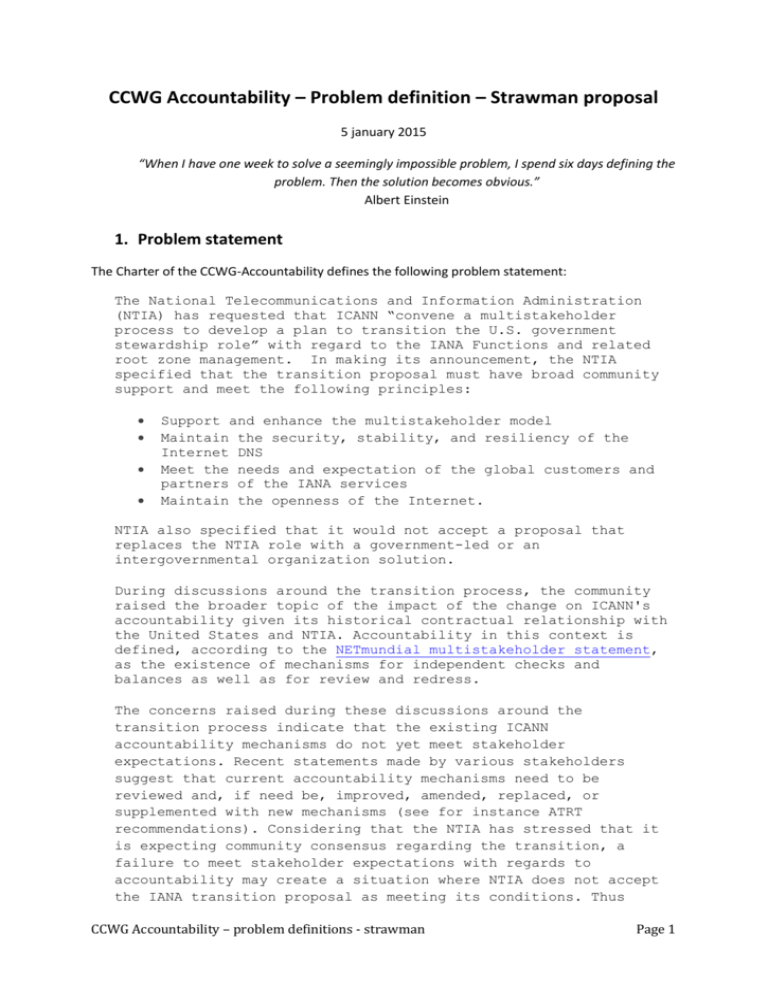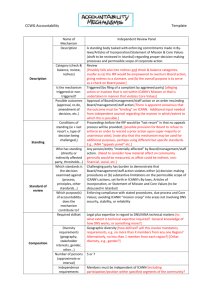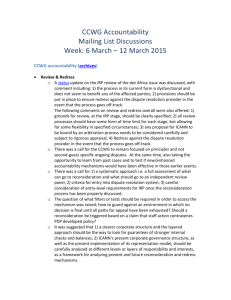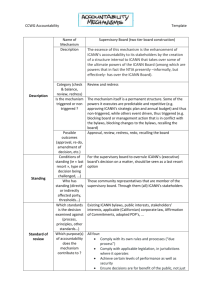ProblemDefinition_Strawman_Jan12
advertisement

CCWG Accountability – Problem definition – Strawman proposal 5 january 2015 “When I have one week to solve a seemingly impossible problem, I spend six days defining the problem. Then the solution becomes obvious.” Albert Einstein 1. Problem statement The Charter of the CCWG-Accountability defines the following problem statement: The National Telecommunications and Information Administration (NTIA) has requested that ICANN “convene a multistakeholder process to develop a plan to transition the U.S. government stewardship role” with regard to the IANA Functions and related root zone management. In making its announcement, the NTIA specified that the transition proposal must have broad community support and meet the following principles: Support and enhance the multistakeholder model Maintain the security, stability, and resiliency of the Internet DNS Meet the needs and expectation of the global customers and partners of the IANA services Maintain the openness of the Internet. NTIA also specified that it would not accept a proposal that replaces the NTIA role with a government-led or an intergovernmental organization solution. During discussions around the transition process, the community raised the broader topic of the impact of the change on ICANN's accountability given its historical contractual relationship with the United States and NTIA. Accountability in this context is defined, according to the NETmundial multistakeholder statement, as the existence of mechanisms for independent checks and balances as well as for review and redress. The concerns raised during these discussions around the transition process indicate that the existing ICANN accountability mechanisms do not yet meet stakeholder expectations. Recent statements made by various stakeholders suggest that current accountability mechanisms need to be reviewed and, if need be, improved, amended, replaced, or supplemented with new mechanisms (see for instance ATRT recommendations). Considering that the NTIA has stressed that it is expecting community consensus regarding the transition, a failure to meet stakeholder expectations with regards to accountability may create a situation where NTIA does not accept the IANA transition proposal as meeting its conditions. Thus CCWG Accountability – problem definitions - strawman Page 1 reviewing ICANN’s accountability mechanisms was considered to be crucial for the transition process. The CCWG-Accountability reviewed these guidelines as well as took into consideration inputs from the session organized during ICANN 50 in London, on 26 June 2014, titled “Enhancing ICANN Accountability”1. Of particular interest were some questions raised by Professor Jan Aart Scholte2, from the University of Gothenburg: - Accountability to whom? What is accountability? Accountability for what purpose? The purpose of this section is to provide the preliminary view of the CCWG-Accountability on these fundamental questions, clarifying the issues at stake, in order to guide the work of the group going forward. 2. To whom should ICANN be accountable? The CCWG-Accountability provides the following clarification (emphasis added), as well as a definition of stakeholders: The CCWG-Accountability is expected to deliver proposals that would enhance ICANN’s accountability towards all stakeholders. The term stakeholder should be considered for the CCWGAccountability in its wider acceptance, for instance by relying on the definition provided by the European Framework for Quality Management (EFQM): a person, group or organization that has a direct or indirect stake or interest in the organization because it can either affect the organization or be affected by it. This includes but is not limited to all ICANN SOs and ACs. The view of the group is that this definition is useful, and can be further clarified by illustrating which stakeholders can affect ICANN or be affected by ICANN, either directly or indirectly. These definitions may be referenced at further stages to clarify which parties may have standing ground to certain accountability mechanisms, should participate to certain groups to provide appropriate checks and balances, or assess the level of independence of certain existing or contemplated mechanisms. a. Affected parties Affected parties are individuals or entities upon which the decisions made by ICANN have an impact. i. Directly-affected parties The group classifies directly-affected parties as parties affected by ICANN’s decisions through contracts or individual decisions. They would therefore include: 1 https://london50.icann.org/en/schedule/thu-enhancing-accountability Professor Scholte has since then been appointed by the Public Experts Group as an Advisor to the CCWGAccountability 2 CCWG Accountability – problem definitions - strawman Page 2 - gTLD registries ICANN-accredited registrars ccTLD managers as far as IANA decisions are processed (and only through that aspect) RIRs IETF Dispute Resolution Providers, e.g. for UDRP and URS ICANN contractors such as the TMCH operator ii. Indirectly-affected parties Other parties are affected indirectly by ICANN’s decisions, mainly through its policies: - Internet users (if a domain name is taken down for instance) gTLD registrants (through UDRP or WHOIS verification policies for instance) ccTLD registrants (through potential IANA performance issues if they affected security and stability of the DNS) Governments (including law enforcement agencies) Right holders (ex: UDRP, URS, TMCH…) ISPs (through numbering allocation policies for instance) Specific industries or sectors of the economy (through the introduction of new gTLDs) Registry services providers Domain name resellers Root zone maintainer (through IANA Functions Contract, or any future arrangement) b. Parties that affect ICANN Parties affecting ICANN are parties that influence ICANN’s decisions or actions, either directly or indirectly, or shape the environment in which ICANN operates. i. Parties affecting ICANN directly The group classifies as parties affecting ICANN directly the individuals or entities that participate directly in ICANN’s decision processes. They would therefore include: - Registry Stakeholder Group (RySG) and Registrar Stakeholder Group (RrSG) Commercial business users (BC), Intellectual Property Constituency (IPC), Internet Service Provider and Connectivity Providers Constituency (ISPCP) Non-Commercial Users Constituency (NCUC), Not for Profit Operational Concerns Constituency (NPOC), Non Commercial Stakeholder Group (NCSG) Governments in the GAC Security experts (SSAC) Internet users (through ALAC) RIRs (through ASO) ccTLD managers who are ccNSO members, as well as ccTLD regional organizations such as CENTR or APTLD NomCom nominees to the various groups Root server operators (RSSAC) CCWG Accountability – problem definitions - strawman Page 3 - The NTIA (currently) through the AOC ICANN Board ICANN staff and contractors Community members participating in public comment fora or corresponding with ICANN ii. Parties affecting ICANN indirectly Other parties affect ICANN or shape its environment, although indirectly, such as: - The US Congress (through various auditions and legislations that affect ICANN as a US-based organization and an organization in contract with the US government through NTIA) Governments that are not GAC members ccTLDs that are not ccNSO members Other entities working on communication policy such as the IGF, UN family of organization (CSTD, ITU), Internet Society, etc. 3. What is accountability? The CCWG-Accountability Charter once again provides a helpful starting point to this key question. Accountability in this context is defined, according to the NETmundial multistakeholder statement, as the existence of mechanisms for independent checks and balances as well as for review and redress. The definition clarifies how accountability can be achieved: by providing the appropriate set of mechanisms. The goal of the group is to enhance ICANN’s accountability by elaborating proposals for enhancements or new mechanisms. The focus on this definition is therefore absolutely critical to the CCWG. However further clarity regarding the definition’s various components is needed. a. Checks and balances The group defines “checks and balances mechanisms” as a series of mechanisms put in place to adequately address the concerns from the various interested parties in the discussion and decision process, as well as to ensure that certain key impacts are safely managed without risk for the incumbent and future parties. These mechanisms may be triggered by one or more parties and may also be specific to a certain party and exclusive of third parties. Examples include: - Establishment of balanced groups of stakeholders to shape or define policy decisions (e.g. the composition of the GNSO Council and the ICANN Board of Directors) Ability to provide advice before a decision is made (e.g. Advisory Committees such as GAC, SSAC) b. Review mechanisms CCWG Accountability – problem definitions - strawman Page 4 The group considers review mechanisms to be mechanisms that assess the performance and relevance of processes or structures, and provide recommendations (binding or not binding) for improvement. Examples include: - Periodic structural reviews of SOs and ACs (as currently mandated in the ICANN Bylaws) AoC-mandated ICANN organizational reviews for Accountability and Transparency; Security, Stability, and Resiliency; WHOIS; and Competition and Consumer Trust. c. Redress mechanisms The group defines redress mechanisms as mechanisms that focus on assessing the compliance or relevance of a certain decision, and can conclude to its confirmation, cancellation or amendment. The output of such mechanism shall be binding. Examples include: - Independent Review (if it is considered to be binding) State of California or jurisdictions where ICANN has a presence Court decisions d. Independence The NETmundial definition of accountability relies on the existence of “independent” mechanisms. It is well known that independence is extremely difficult to define and assess as the demarcation of having no interest, having an interest and being conflicted is often unclear. Notably, the group investigated two different views (non exclusive) in order to assess independence: independence of persons participating in the decision process, and independence of a specific accountability mechanism with regards to other mechanisms. i. Independence of persons participating in the decision process The notion of independence is well researched in corporate governance through the notion of independent Director, which appears in many countries corporate governance codes of conduct. One definition is provided as such3 : “For the purpose of this clause the expression 'independent directors' means directors who apart from receiving director's remuneration, do not have any other material pecuniary relationship or transactions with the company, its promoters, its management or its subsidiaries, which in judgment of the board may affect independence of judgment of the directors." For the benefit of this CCWG, independence of a mechanism could be assessed through the independence of the persons involved in making or validating the decision along these lines: 3 Are we making a mockery of independent directors? Dr. Madhav Mehra, President, World Council for Corporate Governance (circa 2004) CCWG Accountability – problem definitions - strawman Page 5 The persons involved in making or validating the decision, apart from participating to this mechanism, do not have any other material relationship, transaction or professional aspiration with ICANN which may affect their independence of judgment. It should be noted that such a definition has triggered an ongoing debate regarding the loss of the qualification of “independent” after a certain number of years of service as Board member in a company. ii. Independence of a specific accountability mechanism Considering the special nature of the multistakeholder model, which by definition empowers interested parties to participate and make decisions, the group considers that independence could also be considered as independence between the various accountability mechanisms. Independence of two accountability mechanisms can be assessed through: - Examining whether the persons making decisions in one of the mechanism are similar to the other mechanism - Examining whether the persons making decisions in one of the mechanism are appointed by the persons in charge of the other mechanism - Examining whether the persons making decisions in one of the mechanism have material relationships with the other mechanism that may affect their independence of judgment. - Examining whether the persons making decisions in one of the mechanisms have conflicted interests in any of the mechanisms they take part. 4. What is the purpose of ICANN’s accountability ? This question mentioned by Professor Scholte in London raised a healthy and thorough discussion on the CCWG mailing list. Different perspectives were expressed, exposing clearly how different the views could be in the community about the ultimate goals and priorities of ICANN. However, the discussion was useful in enabling identification of two types of purpose that are relevant: a. ICANN should be accountable to complying with its own rules and processes (“due process”) One of the key purposes of ICANN’s accountability is to ensure that ICANN, when elaborating policies, implementing or enforcing them, follows the specific rules and processes that were set, either by its Bylaws or through the policies themselves. Stakeholders expect ICANN to abide to these rules since ICANN is empowered to affect their operations or environment through its actions. This implies that accountability mechanisms must be put in place to address for example: - Disregard of established procedures (such as binding advice not being followed, or the absence of PDP…) Decisions being taken outside of remit (a group or staff member taking a decision that extends beyond its mission) Violations of policy or process, such as decisions without material information CCWG Accountability – problem definitions - strawman Page 6 This particular purpose of accountability should not affect the ability to evolve the rules and processes themselves, when appropriate and following predefined rules and processes. b. ICANN should be accountable to achieving certain levels of performance as well as security Aside from compliance, ICANN is also expected to deliver certain services to certain stakeholders. These services are, among other things, related to the IANA function, but not only. The Global Domains Division within ICANN serves gTLD registries and registrars. ICANN also operates the L-root. Like any professional organization, ICANN should be held accountable to provide these services at the appropriate level of performance. This performance can be expressed in terms of: - Service levels (through, for instance, a Service Level Agreement), expressed for instance in terms of delay to service a request; Security level (especially for key infrastructure such as DNSSEC facilities) or data collected by ICANN; Cost to achieve the given levels of performance. c. Icann should be accountable to comply with applicable legislation, in jurisdictions where it operates ICANN, like any organization, is accountable to comply with applicable legislation, in jurisdictions where it operates. d. Icann should be accountable to ensure that its decisions are balancing the interests of all stakeholders The term “public interest” is referenced several times in the Affirmation of Commitment between Icann and the US Government’s Department of Commerce4. Considering the differences of approach regarding the definition of this notion, whiwh is not provided by the AoC, as well as the changing nature of the needs of the Internet and the Internet users, the group considers that one of Icann’s accountability purpose can be defined as ensuring that its decisions are, to quote the AoC, “in the public interest, and not just the interests of a particular set of stakeholders”. The term stakeholder should be understood here as defined above in this document, including directly and indirectly affected parties as well as directly and indirectly affecting parties. Clarifying ICANN’s notion of public interest would however most certainly be highly beneficial to the organization by setting clear expectations with all stakeholders on what it can and cannot be held accountable to. The CCWG-Accountability took note that this action was alluded to in ICANN’s Strategic Plan. 4 https://www.icann.org/resources/pages/affirmation-of-commitments-2009-09-30-en CCWG Accountability – problem definitions - strawman Page 7


